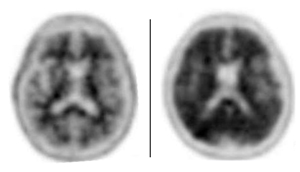Clinical PET scans to help diagnose Alzheimer’s disease
In research studies, scientists regularly use positron emission tomography (PET) scans to detect signs of Alzheimer’s disease. Now, Washington University physicians at Barnes-Jewish Hospital are the first in Missouri to offer a new type of PET scan for patients with memory disorders and other forms of cognitive impairment who are not involved in research studies.

This new imaging test is now available to patients being evaluated for Alzheimer’s disease because the U.S. Food and Drug Administration (FDA) recently approved the use of a radioactive diagnostic agent, Amyvid™ (Florbetapir F 18 Injection), for use in a clinical setting.
The agent detects neuritic plaques, a hallmark of Alzheimer’s disease, by binding to abnormal deposits of the protein beta-amyloid that develop in the brains of patients with the disorder. This makes the plaques “light up” during a PET scan.
“We’re using the scans in patients whose cognitive function is impaired,” says Farrokh Dehdashti, MD, professor of radiology in the Division of Nuclear Medicine at the Mallinckrodt Institute of Radiology. “First, the patient sees a neurologist, or other specialist in cognitive disorders, to confirm that a test like this would be appropriate, and then we conduct the PET scan to learn whether amyloid plaques are present. In that way, the test allows both doctors and patients to have a better idea of whether the patient’s cognitive impairment is related to Alzheimer’s disease or some other illness.”
With FDA approval, nuclear medicine specialists like Dehdashti can now use the diagnostic agent, which has a longer half-life than the compound used in research studies, making it better suited for clinical use. As a single test, PET scans can’t confirm Alzheimer’s disease, but a negative test that finds no evidence of elevated beta-amyloid can help rule out the disease as the cause for the patient’s cognitive impairment.

“What complicates the results of a scan is that although Alzheimer’s disease is very common, it’s not the only reason that we might detect amyloid,” according to Jonathan McConathy, MD, PhD, assistant professor of radiology. “A positive scan could mean that a person has Alzheimer’s disease, or it could be related to some other neurologic disorder. It’s also possible to find amyloid in the brain of a person who has no symptoms of Alzheimer’s disease or other cognitive problems, so a positive test doesn’t confirm that someone has the disease.”
He says a positive scan indicates only that elevated levels of amyloid are present. But amyloid plaques can accumulate in the brains of people with other types of neurologic problems, such as dementia with Lewy bodies or cerebral amyloid angiopathy. Plaques also can occur in some older adults who are cognitively normal.

“The test should be used in conjunction with other diagnostic evaluations from a neurologist,” Dehdashti says. “But when a scan is negative, it’s highly unlikely that the cognitive impairment is due to Alzheimer’s disease.”
“These PET scans have the potential to be really useful as treatments for Alzheimer’s are developed,” McConathy says. “Once we have treatments to significantly slow down or stop the progression of Alzheimer’s disease, then I think this kind of imaging will become very important in deciding who should be treated and, potentially, whether a treatment is working.”
Amyvid™ (Florbetapir F 18 Injection), is manufactured by Eli Lilly and Co. and Avid Radiopharmaceuticals Inc., a wholly owned subsidiary of Lilly.
Washington University School of Medicine’s 2,100 employed and volunteer faculty physicians also are the medical staff of Barnes-Jewish and St. Louis Children’s hospitals. The School of Medicine is one of the leading medical research, teaching and patient care institutions in the nation, currently ranked sixth in the nation by U.S. News & World Report. Through its affiliations with Barnes-Jewish and St. Louis Children’s hospitals, the School of Medicine is linked to BJC HealthCare.